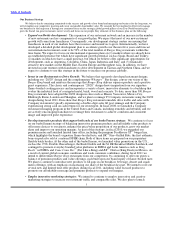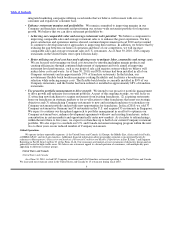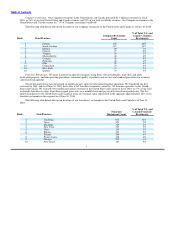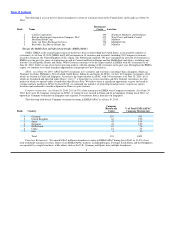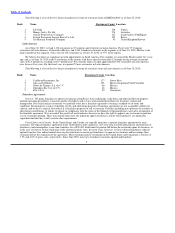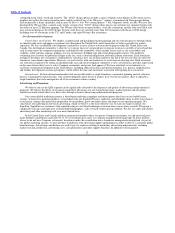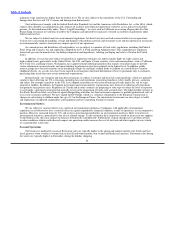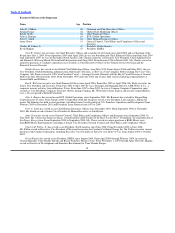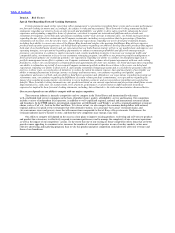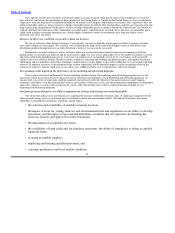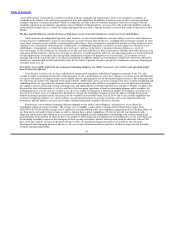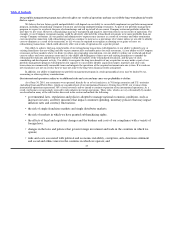Burger King 2010 Annual Report Download - page 17
Download and view the complete annual report
Please find page 17 of the 2010 Burger King annual report below. You can navigate through the pages in the report by either clicking on the pages listed below, or by using the keyword search tool below to find specific information within the annual report.
Table of Contents
Additionally, we own certain patents relating to equipment used in our restaurants and provide proprietary product and labor
management software to our franchisees. Patents are of varying duration.
Management
Substantially all of our executive management, finance, marketing, legal and operations support functions are conducted from our
global restaurant support center in Miami, Florida. In addition, we operate restaurant support centers domestically and internationally to
support both franchised operations and Company restaurants. In the U.S. and Canada, our franchise operations are organized into eight
divisions, each of which is headed by a division vice president supported by field personnel who interact directly with the franchisees.
Our EMEA headquarters are located in Zug, Switzerland and our APAC headquarters are located in Singapore. In addition, we operate
restaurant support centers located in Madrid, London, Munich, Istanbul, Rotterdam and Gothenburg (for EMEA), and Singapore and
Shanghai (for APAC). These centers are staffed by teams who support both franchised operations and Company restaurants. Our Latin
American headquarters are located at our corporate offices in Miami, Florida; however, we operate restaurant support centers in Mexico
and Brazil.
Management of a franchise restaurant is the responsibility of the franchisee, who is trained in our techniques and is responsible for
ensuring that the day−to−day operations of the restaurant are in compliance with the Manual of Operating Data.
Competition
We operate in the FFHR category of the QSR segment of the broader restaurant industry. We compete in the United States and
internationally with many well−established food service companies on the basis of product choice, quality, affordability, service and
location. Our competitors include a variety of independent local operators, in addition to well−capitalized regional, national and
international restaurant chains and franchises. In the FFHR industry our principal competitors are McDonald’s Corporation, or
McDonald’s and Wendy’s/Arby’s Group, Inc., or Wendy’s, as well as regional hamburger restaurant chains, such as Carl’s Jr., Jack in
the Box and Sonic. To a lesser extent, we also compete for consumer dining dollars with national, regional and local (i) quick service
restaurants that offer alternative menus, (ii) casual and “fast casual” restaurant chains, and (iii) convenience stores and grocery stores
that offer menu items comparable to those of Burger King restaurants. Furthermore, the restaurant industry has few barriers to entry,
and therefore new competitors may emerge at any time.
Government Regulation
We are subject to various federal, state and local laws affecting the operation of our business, as are our franchisees. Each Burger
King restaurant is subject to licensing and regulation by a number of governmental authorities, which include zoning, health, safety,
sanitation, building and fire agencies in the jurisdiction in which the restaurant is located. Difficulties in obtaining, or the failure to
obtain, required licenses or approvals can delay or prevent the opening of a new restaurant in a particular area.
In the United States, we are subject to the rules and regulations of the Federal Trade Commission, or the FTC, and various state
laws regulating the offer and sale of franchises. The FTC and various state laws require that we furnish to certain prospective
franchisees a franchise disclosure document containing prescribed information. A number of states, in which we are currently
franchising, regulate the sale of franchises and require registration of the franchise disclosure document with state authorities and the
delivery of a franchise disclosure document to prospective franchisees. We are currently operating under exemptions from registration
in several of these states based upon our net worth and experience. Substantive state laws that regulate the franchisor/franchisee
relationship presently exist in a substantial number of states. These state laws often limit, among other things, the duration and scope of
non−competition provisions, the ability of a franchisor to terminate or refuse to renew a franchise and the ability of a franchisor to
designate sources of supply.
Company restaurant operations and our relationships with franchisees are subject to federal and state antitrust laws and federal and
state laws governing such matters as consumer protection, privacy, wages, union organizing, working conditions, work authorization
requirements, health insurance and overtime. Some states have set
15


